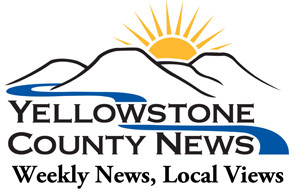HUNTLEY — Railroad police officers have come a long way since the days when they worked with the Pinkerton’s detectives and U.S. Marshals on the western frontier.
Justin Douglas, special agent for Burlington Northern Santa Fe Railway working out of the railway’s new Billings office, is more likely to use a drone or canine assist than a horse or stagecoach, but the top priority of the railway remains the same: transporting freight and maintaining equipment to keep people safe.
Douglas began his official duties in Billings on Sept. 1. He transferred to the area from Chicago when a longtime agent retired and the railway moved the regional office from Gillette, Wyoming, to Billings.
Coming to Billings feels like home for Douglas and his wife — he grew up in Moorhead, Minnesota, and she’s from Mandan, North Dakota. But the veteran BNSF employee — a former conductor and XX as well as Chicago law enforcement officer — doesn’t expect to see much of the new Billings office.
Douglas is assigned to a region that includes 17 counties and 620 track miles in Montana and eight counties and 432 track miles in Wyoming, an area that extends south to Casper.
With two other railway agents in Whitefish and Havre, Douglas concedes that a backup officer may be a long way away. He operates  with full status as a law enforcement officer in Montana through a commission by Attorney General Tim Fox. Railway law enforcement officers are authorized by a federal U.S. code to conduct investigations across state lines, Douglas said.
with full status as a law enforcement officer in Montana through a commission by Attorney General Tim Fox. Railway law enforcement officers are authorized by a federal U.S. code to conduct investigations across state lines, Douglas said.
He depends on assistance from city, county or state Highway Patrol officers as needed, he said. It’s different than Chicago, where numerous police officers could be on patrol in an area of 10 to 15 square blocks around a railroad track incident.
Also, livestock or wildlife, like antelope or deer, rarely interfered with rail traffic in Chicago, but they might out here, he said.
Top criminal offenses he investigates include trespassing and theft of services, he said. Trespassing can range from walking or riding motorcycles on railroad tracks to people hiding in railroad equipment, including rail cars, or “almost anywhere they can’t be seen,” Douglas said, leading to theft of services when they attempt to hitch free rides on trains.
“It’s incredibly dangerous and illegal,” he said, something he knows first hand from his earlier work as a conductor. People don’t realize how dangerous trains are, he said.
Vandalism, ranging from spray-painting graffiti on cars to damaging equipment in rail yards, is another common offense, he said.
Already a top priority, railroad safety and security ramped up after 9/11. Douglas said trains started carrying much more hazardous freight as transportation concerns shifted those loads from trucking. Because of the potentially dangerous load that any freight train could be hauling, he said, it’s imperative that people do not trespass on railway property and that they do not cause accidents.
He said anyone who notices a problem with a track or crossing should attempt to contact railroad officials right away, along the lines of the common law enforcement refrain, if you see something, say something.
If it seems like an emergency, call 911, he said.
Otherwise, the caller can contact BNSF dispatch at 800-832-5452. Every crossing in the United State has a sign that states what entity owns the crossing and a phone number to call to report problems, plus a location name so people know where they are.
Douglas said reported problems have included crossing gates that were stuck closed and vehicles, animals or other things blocking tracks.
“We definitely want people to be aware that we’re out there,” Douglas said. “Don’t be afraid to give us a call. Our goal is public safety. Please don’t hesitate to reach out to us.”

